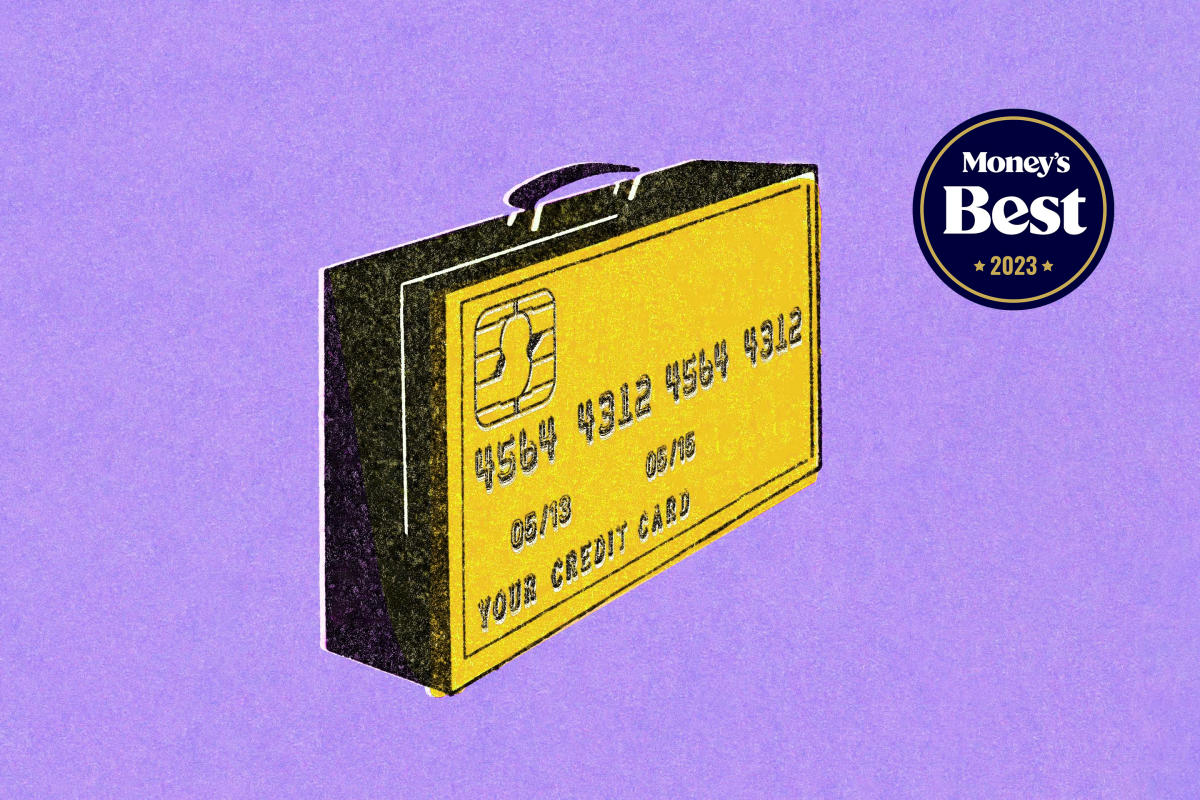Personal Finance
6 Best Business Credit Cards of 2023

-
Best No-Annual Fee Card
Chase Ink Business Cash(R) Credit Card
Our Partner
-
Annual Fee:
$0
-
Rewards Rate:
5% cash back at office supply stores and on cable, internet and phone services, 2% cash back at gas stations and restaurants (on up to $25,000 spent in combined purchases)
Learn More
-
-
Best for Business-Related Expenses
Chase Ink Business Preferred(R) Credit Card
Our Partner
-
Annual Fee:
$95
-
Rewards Rate:
3x points on shipping and advertising purchases, internet, cable and phone services and travel (on up to $150,000 per year)
Learn More
-
-
Best for Everyday Spending
The Blue Business(R) Plus Credit Card from American Express
Our Partner
-
Annual Fee:
$0
-
Rewards Rate:
2x points on all purchases on the first $50,000 spent per year. (Terms Apply.)
Learn More
-
-
Best for Premium Benefits
The Business Platinum Card(R) from American Express
Our Partner
-
Annual Fee:
$695
-
Rewards Rate:
5x points on flights and hotels booked through the Amex travel portal, 1.5x points (up to $2 million per year) on electronic goods retailers, shipping providers, construction materials, hardware supplies, software, cloud service providers and purchases of $5,000 or more. (Terms apply.)
Learn More
-
A business credit card can help streamline and organize your company’s finances. They can make record-keeping easier while giving the company steady purchasing power to manage day-to-day expenses.
These types of credit cards can be valuable financial tools for established businesses, startups and even freelancers. They feature many benefits, like reward categories for advertising or shipping services and financial account management tools. Most lenders also provide free credit cards for employees, and you can create personalized credit limits for each to prevent unexpected expenses.
Read on for our list of the best business credit cards and how to pick the best one for you.
Our Top Picks for the Best Business Credit Cards
-
Chase Ink Business Cash® Credit Card – Best no-annual fee card
-
Chase Ink Business Unlimited® Credit Card – Best for unlimited cash back
-
Chase Ink Business Preferred® Credit Card – Best for small businesses
-
Bank of America Business Advantage Customized Cash Rewards – Best for customizable bonus categories
-
The Blue Business® Plus Credit Card from American Express – Best for everyday spending
-
The Business Platinum Card® from American Express – Best for business travel
Best Business Credit Cards Reviews
Pros
-
No annual fee
-
Includes primary rental car coverage
-
5% cash back on office supplies and cable, internet and phone services (on up to $25,000 yearly)
-
2% cash back at gas stations and restaurants (on up to $25,000 yearly)
Cons
-
Spending cap on bonus categories
-
Foreign transaction fees
HIGHLIGHTS
- Annual fee
- Sign-up bonus
Why we chose it: The Ink Business Cash® is a solid no-annual-fee business credit card that offers generous rewards on office-related expenses, gas stations and restaurants.
The card earns 5% cash back on purchases made at office supply stores and on cable, internet and phone services. It also offers 2% cash back at gas stations and restaurants. Keep in mind that these bonus categories are limited to the first $25,000 spent in combined purchases yearly, so once you reach the cap, you’ll earn only 1% back. All other transactions outside of these categories also get 1% back.
Note that, while the Ink Business Cash® is advertised as a cash-back credit card, it actually earns Chase Ultimate Rewards points, which can be redeemed for cash back (as a statement credit or checking account deposit), gift cards, travel purchases and more through the Chase travel portal. You can also use your points for Apple products or on Amazon.
The card comes with purchase and extended warranty protection. It also includes primary rental car coverage when booking a vehicle for business purposes — a perk not many no-annual-fee credit cards feature. Primary insurance lets you skip the rental company’s optional policy and covers theft or damages without the need to file a claim with your auto insurer first.
Keep in mind that the Ink Business Cash® is not suited for companies with high operational costs. Businesses that spend more than $25,000 each year in this card’s reward categories might get more value from a card with higher spending caps, like the Chase Ink Business Preferred® Credit Card.
Pros
-
Unlimited 1.5x points on all purchases
-
No yearly spending caps
-
Primary rental car insurance
-
No annual fee
Cons
-
No bonus categories
-
Foreign transaction fees
HIGHLIGHTS
- Annual fee
- Sign-up bonus
Why we chose it: The Ink Business Unlimited® offers unlimited 1.5% back on all purchases — one of the highest base reward rates among business credit cards.
Most cash-back cards without an annual fee earn 1% back on most transactions. When they offer higher bonuses, they’re limited to specific shopping categories and sometimes have spending caps. The Ink Business Unlimited®, on the other hand, gives 1.5% back on all transactions, regardless of the purchase category they fall into and without yearly caps.
You can redeem your points as statement credits — that is, you can use it to reduce the balance you owe the card —, checking account deposits, gift cards or travel bookings through the Chase travel portal. You can also use your points for Amazon and Apple purchases.
The Ink Business Unlimited® Credit Card includes extended warranty and purchase protection. It also features primary car rental insurance, an uncommon benefit among no-annual-fee credit cards.
This card is ideal for business owners who don’t want to keep track of spending categories and yearly caps. However, it doesn’t offer any business-oriented bonus categories, so cardmembers spending big on operational expenses like shipping services, advertisement and more could miss out on earning high rewards.
Pros
-
Earn unlimited 1.5% cash back
-
No foreign transactions fees
-
Includes auto rental and travel accident insurance
Cons
-
Rewards are credited quarterly
HIGHLIGHTS
- Annual fee
- Sign-up bonus
Why we chose it: The Wells Fargo Business Platinum Credit Card is another solid pick if you want to earn unlimited cash back without worrying about spending caps or tracking bonus categories.
This card earns 1.5% cash back on every purchase, while other cards only offer 1% on most purchases outside of a few bonus categories. You can get your money back as a statement credit to your monthly balance or a deposit to your eligible Wells Fargo checking or savings account.
The downside is that the cash back is credited quarterly (March, June, September and December). If you’d rather access your rewards monthly, you can choose to earn reward points instead. Points can be redeemed for gift cards, merchandise, travel bookings and more.
Note that if you sign up for the reward points program, you’ll get one point for every dollar — about 0.5 cents less per dollar than if you select cash back. However, Wells Fargo makes up for this slightly reduced reward rate by awarding 1,000 extra monthly points to cardmembers who spend $1,000 or more on a billing cycle.
This card includes auto rental coverage and travel accident insurance, which is rare among no-annual-fee cards. It also offers travel and emergency assistance services that can help with medical referrals, translations, prescriptions and more while traveling.
Pros
-
3x points on internet, cable, phone services, travel and more
-
Points are worth 25% more when you redeem for travel through Chase travel portal
-
No foreign transaction fees
Cons
-
$150,000 annual cap on bonus rate
-
$95 annual fee
HIGHLIGHTS
- Annual fee
- Sign-up bonus
Why we chose it: This card’s bonus categories are ideal for small businesses, and it comes with valuable benefits that more than make up for its low annual fee.
The Chase Ink Business Preferred® Credit Card earns 3x points on shipping and advertising purchases, internet, cable and phone services and travel. Eligible purchases include postal and freight shipping companies, social media advertising, satellite internet plans, airline tickets and more.
The only downside to this card’s reward rate is that it only applies to the first $150,000 spent in combined purchases per year. After that, you’ll earn 1 point per dollar in those categories.
If you take frequent business trips, note that the Ink Business Preferred® lets you transfer accumulated points to over ten airline and hotel partners, including Jetblue, United and Marriott. You can also book trips through the Chase travel portal, which has dozens of offers from other companies beyond their travel partners. And when you redeem rewards through the Chase portal, each point is valued at 1.25 cents apiece instead of the usual one cent.
Points are also valued at 1.25 cents each through the Pay Yourself Back program, which lets you redeem points as statement credits toward qualifying transactions. As of February 2023, shipping, internet, cable and phone service purchases currently qualify for the boosted reward rate, but Chase changes the categories every few months.
Other travel perks included with the Ink Business Preferred® are trip cancellation or interruption insurance and primary car rental insurance (when renting for business purposes). The card also provides extended warranties, purchase protections and a cell phone protection plan.
If you’re a small business owner and want to earn flexible rewards with some travel benefits, the Ink Business Preferred® Credit Card is an excellent choice. However, if your operational costs exceed $150,000 early in the year, you’re better off with the Chase Ink Business Premier℠. It has a steeper annual fee ($195), but it offers 2.5% back on every purchase of $5,000 or more, 2% on all other business purchases, 5% through the Chase travel portal and no reward caps.
Pros
-
Choose your preferred 3% bonus category (from a list six)
-
Bank of America business checking account holders can earn 25-75% more cash back
Cons
-
Bonus categories have a combined annual spending cap of $50,000
-
Has foreign transaction fees
HIGHLIGHTS
- Annual fee
- Sign-up bonus
Why we chose it: Several no-annual-fee cards offer solid reward rates, but few allow cardholders to choose their top-earning category like the Bank of America Business Advantage Customized Cash Rewards does.
This card earns 3% back on a spending category of your choice. You can select between gas, office supply stores and travel. Business-related expenses like telecommunications, wireless, computer and consulting services are also eligible.
You can switch your pick once a month, so if you plan ahead, you can maximize your earnings by tracking your business needs. For example, you could set travel as your preferred bonus category before a business trip and earn 3% back on the flight ticket, hotel, rental car, rideshare services (like Uber) and more.
The Business Advantage Customized Cash Rewards also gives 2% back on dining and 1% on other purchases. But keep in mind that the 3% and 2% rates are limited to the first $50,000 spent in combined purchases yearly (1% back after that).
The card’s bonus categories can become even more lucrative if you qualify for the Bank of America Preferred Rewards for Business program. This program gives certain account holders up to 75% more cash back on their purchases. So instead of the default 3%, you could earn 5.25% back in your preferred category. To qualify for the program, you must have a Bank of America business checking account and a daily balance of $20,000 or more in Bank of America or Merrill.
The customization capabilities of Business Advantage Customized Cash Rewards are enough to make it stand out. But in addition to that, the card features travel perks that aren’t common in no-annual-fee cards, including auto rental insurance, emergency ticket replacement and lost luggage assistance.
Pros
-
No annual fee
-
Earns 2 points per dollar on all purchases (up to $50,000 per year)
-
Can transfer your points to travel partners
-
Includes secondary auto rental coverage*
Cons
-
Statement credits are worth only 0.6 cents per point
Terms apply. Click here for applicable rates and fees.
HIGHLIGHTS
- Annual fee
- Welcome offer
Why we chose it: Bonus categories can sometimes be limiting, especially if they don’t align with your spending habits; however, the Blue Business® Plus Credit Card from American Express makes it easy to earn rewards daily, by giving 2 points per dollar on all purchases. (Terms apply.)
Credit cards typically offer points or cash back on purchases that fall into specific categories, such as travel or gas stations. With this American Express card, you can earn 2 points on all purchases — from office-related expenses to restaurants and more.
However, note that this rate applies to the first $50,000 you spend per year with your Amex card. All other purchases will earn only one point per dollar after you reach the cap.
You can use your points through the Amex travel portal or transfer them to one of the issuer’s airline and hotel partners, which include Delta, Jetblue and Hilton. You can also use them to buy gift cards, make purchases at select online stores and/or redeem for statement credits.
This card includes extended warranty*, purchase protection* and secondary auto rental coverage*. It also features American Express’ Expanded Buying Power, which lets you spend above your credit limit (up to a certain amount). How much extra credit you’re granted depends on your payment history, credit record and financial resources. Note that you must pay the amount spent over your credit limit in full each billing cycle, or you’ll incur interest and over-limit fees.
If you’re looking for a business credit card without an annual fee and with a simple reward system, The Blue Business® Plus Credit Card from American Express is a solid pick. However, note that this card is not ideal if you’d like to redeem your points for statement credits — points are valued at 0.6 cents per dollar this way.
If you prefer statement credit over travel rewards, consider the Blue Business Cash™ Card from American Express. It also earns 2 points per dollar on the first $50,000 spent annually, but your cash back is redeemed as a statement credit at the end of each billing cycle.
Pros
-
Comprehensive travel insurance
-
5x points on flights and hotels booked through Amex Travel portal
-
Transfer points to travel partners, like Delta and Marriott
Cons
-
$695 annual fee
-
Car rental insurance is secondary*
-
Statement credits are worth only 0.6 cents per point
(Terms apply. Click here for applicable rates and fees.)
HIGHLIGHTS
- Annual fee
- Welcome offer
Why we chose it: The Business Platinum Card® from American Express is an excellent business and travel credit card featuring an impressive list of benefits that few other cards can match.
The card provides around $1,000 in yearly statement credits for purchases at Dell, Indeed, Adobe and U.S. wireless telephone providers. Additionally, it earns 1.5x points (up to $2 million per year) on electronic goods retailers, shipping providers, construction materials, hardware supplies, software, cloud service providers and purchases of $5,000 or more. (Terms apply.)
The card also features perks that make it an excellent travel credit card. It earns 5x points on flights and hotels booked through the American Express Travel portal and provides up to $200 in airline fee credits that can cover checked bags, in-flight refreshments and more. It also offers up to $100 for Global Entry or TSA PreCheck and $189 for CLEAR, expedited airport screening programs can help travelers go through security checkpoints faster.
Additionally, this card offers complimentary access to over 1,400 airport lounges worldwide, room upgrades at over 2,000 hotels and resorts and credits for dining and spa treatments at select hotels. It also comes with a comprehensive travel insurance policy that covers trip cancellations*, interruptions and delays*, car rentals* and baggage damage or loss*.
Another advantage of the card is that it provides a rebate when booking flights through the Amex travel portal. Cardholders get a 35% point refund when they redeem their points for first- or business-class tickets with any airline. The rebate is also available when cardholders book any service class ticket (even economy) with their preferred airline. (Customers can pick a preferred airline once per year.)
Note that the offer only applies to the first 1,000,000 bonus points used per calendar year. Also, to receive the rebate, you’ll first need to have enough points saved to cover the total amount of the flight you’d like to book.
The Business Platinum Card® from American Express has a $695 annual fee, one of the market’s steepest annual fees. However, it’s well worth it if you travel enough to take advantage of its extensive list of benefits.
Other business credit cards we considered
Business Gold Card from American Express
Pros
-
4x point on select categories such as airfare and U.S. gas stations
-
Includes car rental, trip delay and baggage insurance*
-
Extra benefits at over 2,000 hotels
Cons
-
Auto rental coverage is secondary*
-
Statement credits are worth only 0.6 cents per point
(Terms apply. Click here for applicable rates and fees.)
HIGHLIGHTS
- Annual fee
- Welcome offer
The American Express® Business Gold Card earns 4x points on your top two spending categories each month, making it ideal for business owners who spend a lot on similar services. The categories that qualify for the 4x bonus rate include airfare (purchased directly from airlines) and U.S. purchases at gas stations, restaurants, shipping providers, select technology providers and media advertisers.
It also features several benefits, including a 25% point rebate when you redeem points for select flights (booked through the Amex travel portal) and insurance for car rentals*, delays and baggage*.
However, the card’s bonus offer is limited to the first $150,000 spent on combined purchases per year, after that; you only get 1x per dollar. Considering this card’s high annual fee ($295), you might be better off with another one if you don’t spend much in the Amex card’s select bonus categories.
Capital One Spark 2% Cash Plus
Pros
-
Unlimited 2% back on all purchases
-
$200 cash bonus each account anniversary year if you spend $200,000 or more
-
Includes car rental insurance
-
No preset credit limit
Cons
-
$150 annual fee
-
Few extra benefits
-
Balance must be paid in full each month
HIGHLIGHTS
- Annual fee
- Sign-up bonus
The Capital One Spark 2% Cash Plus earns 5% cash back on hotels and rental cars booked through the Capital One travel portal and 2% back on all other purchases, with no category restrictions or spending caps.
The Capital One Spark 2% Cash Plus is a charge card, which means it’s not issued with a preset spending limit (also known as credit limit). Each transaction is approved individually based on a person’s income and credit record. This gives business owners with an excellent credit history more flexibility if unexpected expenses arise, allowing them to use their card without worrying about reaching a specific cap.
The downside to charge cards is that their balance must be paid in full each month or else you’ll get charged a fee — unlike standard credit cards that let you accrue a balance as long as you make a minimum payment each month.
The Capital One Spark 2% Cash Plus didn’t make our list because it offers few benefits when compared to other cards with a similar or smaller annual fee ($150). However, it does include car rental insurance, roadside assistance (with a cost per service) and travel emergency assistance. It also offers an extended warranty on eligible items purchased with the card, but this feature is available even with most no-annual-fee credit cards.
Wells Fargo Business Elite Signature Card
Pros
-
Earn either 1.5% back on all purchases or 1% plus an extra 5,000 points if you spend $10,000 or more monthly
-
No foreign transactions fees
-
Includes travel accident insurance, auto rental coverage and lost luggage reimbursement
Cons
-
$125 annual fee
-
Rewards are credited quarterly
-
Aimed at businesses with annual sales over $1 million
HIGHLIGHTS
- Annual fee
- Sign-up bonus
The Wells Fargo Business Elite Signature lets users choose if they’d prefer to earn cash back or reward points, and each option has a different reward rate.
With the cash-back option, cardholders get an unlimited 1.5% back on all purchases. The points option, on the other hand, earns only 1% back, but you receive an additional 5,000 bonus points each monthly billing cycle you spend $10,000 or more.
The card includes some valuable benefits, such as insurance for travel accidents, rental cars and lost luggage. It also offers a yearly $100 reimbursement for incidental travel fees (like seat upgrades) and doesn’t charge any foreign transaction fees, making it a solid option for business trips.
However, while most credit cards let you redeem your cash back or use your points each month, Wells Fargo Business Elite Signature credits rewards quarterly. This means rewards are only available in March, June, September and December.
Business Credit Cards Guide
Business credit cards do more than offer high rewards on business expenditures. They separate your personal and business finances and can help you build business credit, showing creditors and vendors how likely you are to make payments on time.
Read on for an overview of how these cards work and how to choose the best one for you.
What is a business credit card?
Business credit cards provide business owners with a separate line of credit from their personal ones, which can make keeping track of a company’s expenses or filing taxes more efficient.
These cards are designed with businesses in mind, and often feature higher credit limits than personal credit cards and free employee cards with customizable spending limits. They also include account management tools such as automated quarterly and year-end summaries and free access to accounting programs, like Quickbooks.
Business credit cards offer generous rewards for everyday business expenses, including office supplies, phone plans and social media advertising. And most cards also have additional bonus rates for popular everyday spending categories like dining, gas and travel.
Difference between business credit cards and personal credit cards
One of the main differences between business and personal credit cards is to which credit agencies issuers report their activity and how they impact your credit history.
The account activity on personal credit cards gets reported to the three major credit bureaus — Experian, Equifax and TransUnion. These agencies collect consumer financial information, such as payment history and monthly balances, so personal credit cards directly impact your credit report.
On the other hand, activity on business credit cards gets reported to business credit bureaus, such as Dun & Bradstreet. For this reason, business credit cards generally don’t affect your personal credit score. However, while business card issuers mainly report to business credit bureaus, they might report late or missed payments to consumer credit agencies, which impacts your financial history and odds of getting approved for new credit lines.
Another difference between personal and business credit cards is that the latter are not protected by the Credit Card Accountability Responsibility and Disclosure Act of 2009 (CARD Act). This act includes several consumer protection provisions, such as a requirement that credit card issuers alert customers of interest rate hikes at least 45 days in advance.
However, although the CARD Act only applies to consumer credit cards, some business card issuers do add similar protections to their cards by choice.
Types of business credit cards
Here’s a rundown of how the differences between the three main types of business credit cards:
Small business credit cards
Most business cards are available for all business sizes; however, some cards offer perks and benefits that could benefit businesses that don’t have the staff or level of operational expenses that big corporations have. These business cards can benefit small businesses and even individual freelancers.
Like consumer credit cards, small business credit cards have point programs that allow the primary cardholders to earn points for rewards such as hotel nights, flight tickets, cash back and gift cards.
Other business credit cards earn cash back rewards, which can typically be redeemed as statement credits or checking account deposits. However, nowadays, it’s common to find business cards that are advertised as cash back credit cards but also let cardholders redeem their rewards as gift cards, travel bookings or through online store checkouts, for example.
Most small business credit cards require a personal guarantee, which means that if the company ever goes bankrupt or is behind on payments, you’ll be personally liable for the remaining debt on the card.
Corporate credit card
Corporate credit cards are usually geared towards larger corporations with a well-established business history, significant revenue and hundreds or more employees.
A business must be registered as C-Corp, S-Corp or LLC to qualify, not as a sole proprietorship or partnership (although some card issuers welcome all business structures). Also, the company is responsible for paying the card, not the owner directly. This means that approval of the account is based mainly on the company’s finances — unlike small business cards, which take into account an individual’s credit report.
Besides these features, corporate cards are no different from small business ones. They both offer reward rates for spending categories and may feature business and travel perks such as statement credits for software purchases or discounted airfare.
Charge cards
Business charge cards don’t have pre-set spending limits like regular credit cards do. Instead, they must be paid in full each month and do not give the option of making minimum payments. Because you’re paying your debt in full every month, these cards don’t charge interest either. If the bill is not paid on time at the end of a billing cycle, you’ll incur late fees and other penalties, depending on your card’s agreement.
Not having an established credit limit doesn’t mean charge cards can be used indiscriminately. Each transaction you make is approved individually based on your income and payment history.
How do business credit cards work?
While they differ in some ways, business credit cards work pretty much in the same way as personal cards do. With the exception of charge cards, both business and personal cards give users access to a revolving line of credit, meaning you can make purchases or take out cash advances up to a certain amount, known as the credit limit.
You’ll receive an account statement at the end of each billing cycle disclosing the total amount owed and a minimum amount due. Paying the full balance is recommended to avoid paying interest charges and late fees and to keep your account in good standing. Making the minimum payment also allows you to avoid late fees, but it’s not recommended as you’ll start raking up interest charges on your remaining balance.
Business credit scores
Business credit scores are calculated based on your business’s credit report, which can include details such as the number of employees, debt owed and payment history. Similar to your credit score, a business credit score tells issuers how likely or not a company is to pay back debt.
Most business credit scores are ranked on a scale of 0 to 100. For example, the PAYDEX scoring system by Dun & Bradstreet classifies companies with ratings of 80 or more as prompt payers, while those with scores below 50 are at a high risk of making payments 30 or more days past due.
If you’d like to check out your company’s credit score, you’ll have to either pay a one-time fee or subscribe to the bureaus’ credit monitoring services. Here’s where you can request the report and score of each business credit bureau:
-
Dun & Bradstreet
-
Equifax
-
Experian
Do note that to get a business credit score from Dun & Bradstreet, you first need a D-U-N-S (Data Universal Numbering System) number. You can request one for free here.
EIN number
An Employer Identification Number, or EIN, is a unique nine-digit number issued to your business by the Internal Revenue Service (IRS). An EIN is necessary to file taxes, open a business bank account and apply for business licenses and credit cards.
Independent contractors and freelancers are generally not required to have an EIN; only business owners with employees do. However, there are exceptional cases, so check out this guide from the IRS to check if you need an EIN. You can apply online using the IRS’s EIN Assistant if you need one.
How to get a business credit card
You should evaluate your credit history yourself before applying for a business credit card so you can get an idea of what lenders will see. This step is particularly important if your business doesn’t have a long credit history.
Creditors will also ask for detailed information about your company’s revenue and expenses. Providing as much documentation as possible will help you get the best terms possible.
To get the card that meets your needs, review your business spending and compare several cards based on their fees and interest rates, bonus rewards, redemption options, ongoing benefits and welcome offers. For example, if you travel often, you may want a card that offers lost baggage and car rental insurance.
Requirements for a business credit card
Most applications can be completed online in a couple of minutes. Here are some details you’ll likely need to provide during the process:
-
Legal name
-
Date of birth
-
Social Security number
-
Home address
-
Email address
-
Phone number
-
Annual income
-
Business name and contact information
-
Number of employees
-
Business type and category
-
Legal business structure
-
Employer identification number (EIN)
-
Estimated revenue
-
Monthly expenses
Pros and Cons of having a business credit card
Pros
-
Some cards offer high rewards on business-related spending categories, like office supply stores and internet plans.
-
Cards include account and expense management tools, such as year-end account summaries and bookkeeping software.
-
You can give cards to each of your employees, assign separate credit limits and monitor their spending.
Cons
-
Most require a personal guarantee, which means you’ll be personally liable for any debt even if the business fails.
-
Their highest reward rates are limited to business purchases.
-
To qualify, the card issuer will look into your personal credit history and credit score. A poor credit history will lower your approval odds.
Latest News in Business Credit Cards
-
Credit card debt and delinquencies have been on the rise, causing banks to get stricter with their approvals. Read more about it in our article Why Getting Approved for a Credit Card is Becoming Harder (and What You Can Do About It).
-
Total credit card debt has increased rapidly, prompting many to wonder how they should go about handling their credit card bills. We explain how in What Will It Take To Pay Off My Credit Card?
-
Inflation and increased interest rates resulted in a significant increase of new credit cards applications. Read more about it in American Are Getting Tons of New Credit Cards to Cope with Inflation.
Business Credit Cards FAQ
What is an EIN?
An Employer Identification Number (EIN) is a nine-digit number issued by the Internal Revenue Service (IRS) and is necessary to file taxes, open a business bank account and apply for business licenses and credit cards. New businesses can request one online through the IRS website.
What is the best business credit card?
The best credit card for your business depends on your company’s needs. When comparing credit card offers, take the time to evaluate reward rates and ongoing benefits, as well as fees and interest rates. We found that some of the best business credit cards offer high rewards on office supplies, phone plans and media advertising purchases, like the Chase Ink Business Cash(R) Credit Card and the The Business Platinum Card(R) from American Express.
How do I check my business credit score?
To check your company’s score, you have to either pay a one-time fee or subscribe to a credit monitoring service by one of the business credit bureaus — Dun & Bradstreet, Equifax and Experian.
Who can get a business credit card?
Anyone who operates a business can apply for a business credit card, whether it is a sole proprietor, partnership, corporation or limited liability company.
How We Chose the Best Business Credit Cards
We evaluated dozens of business credit cards based on their rewards rates, ongoing benefits, fees and redemption options.
-
Reward programs. We evaluated the rewards programs of each card and considered how their spending categories could help businesses maximize earnings.
-
Ongoing benefits. We preferred cards that feature several ongoing benefits, like extended warranty, purchase protection, rental car insurance, travel coverage and more.
-
Introductory offers. If some cards had similar bonus rates and benefits, we compared their welcome bonuses and intro APR offers.
-
Fees. We considered each card’s annual, foreign transaction, cash advance and balance transfer fees.
Summary of Money’s Best Business Credit Cards of February 2023
-
Chase Ink Business Cash® Credit Card – Best no-annual fee card
-
Chase Ink Business Unlimited® Credit Card – Best for unlimited cash back
-
Chase Ink Business Preferred® Credit Card – Best for small businesses
-
Bank of America Business Advantage Customized Cash Rewards – Best for customizable bonus categories
-
The Blue Business® Plus Credit Card from American Express – Best for everyday spending
-
The Business Platinum Card® from American Express – Best for business travel
* Insurance disclosures for American Express Cards on this page:
Trip Delay Insurance: Eligibility and Benefit level varies by Card. Terms, Conditions and Limitations Apply. Please visit americanexpress.com/benefitsguide for more details. Underwritten by New Hampshire Insurance Company, an AIG Company.
Global Assist Hotline: Eligibility and Benefit level varies by Card. Terms, Conditions and Limitations Apply. Please visit americanexpress.com/benefitsguide for more details. Card Members are responsible for the costs charged by third-party service providers.
Extended Warranty, Purchase Protection, Baggage Insurance Plan: Eligibility and Benefit level varies by Card. Terms, Conditions and Limitations Apply. Please visit americanexpress.com/benefitsguide for more details. Underwritten by AMEX Assurance Company.
Car Rental Loss & Damage Insurance: Eligibility and Benefit level varies by Card. Terms, Conditions and Limitations Apply. Please visit americanexpress.com/benefitsguide for more details. Underwritten by AMEX Assurance Company. Car Rental Loss or Damage Coverage is offered through American Express Travel Related Services Company, Inc.
© Copyright 2023 Money Group, LLC. All Rights Reserved.
This article originally appeared on Money.com and may contain affiliate links for which Money receives compensation. Opinions expressed in this article are the author’s alone, not those of a third-party entity, and have not been reviewed, approved, or otherwise endorsed. Offers may be subject to change without notice. For more information, read Money’s full disclaimer.
Read the full article here

-

 Side Hustles7 days ago
Side Hustles7 days agoWhy the Best CEOs Think Like Anthropologists
-

 Side Hustles5 days ago
Side Hustles5 days agoThis User-Friendly H&R Block Software Package is Only $40, While Supplies Last
-

 Investing5 days ago
Investing5 days agoTikTok faces US ban deadline as users brace for fallout By Reuters
-

 Passive Income4 days ago
Passive Income4 days agoTrain for a New Tech Career in 2025 With This $25 Course Bundle
-

 Personal Finance6 days ago
Personal Finance6 days agoDecember inflation clouds Fed's outlook on interest rate cuts
-

 Personal Finance7 days ago
Personal Finance7 days agoCalifornia's homeowners insurance industry faces rough road ahead as wildfires continue
-

 Investing7 days ago
Investing7 days agoWhy Not Owning Bitcoin is Making You Poor
-

 Side Hustles6 days ago
Side Hustles6 days agoSupreme Court TikTok Ban: What to Know, January 19 Deadline


















